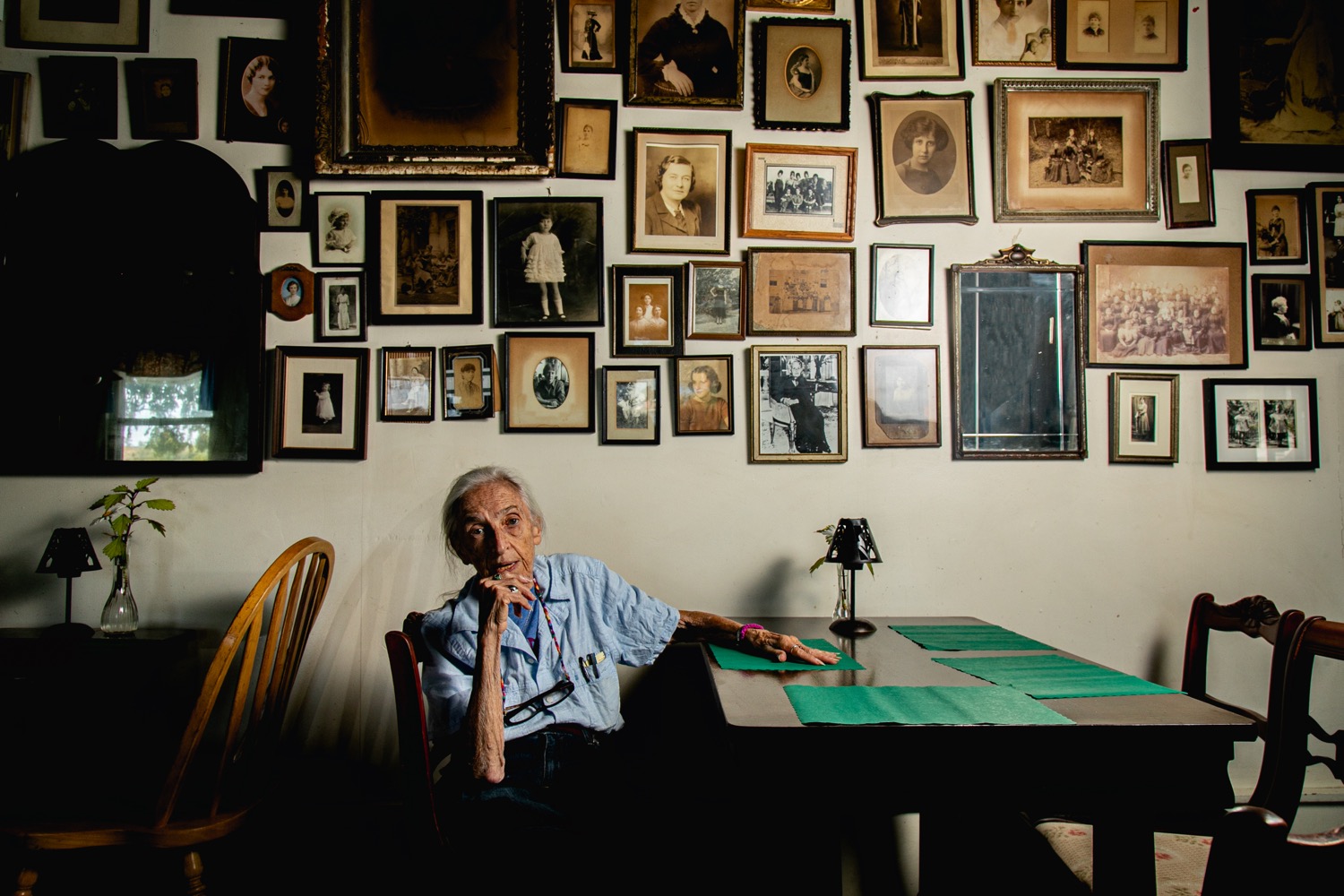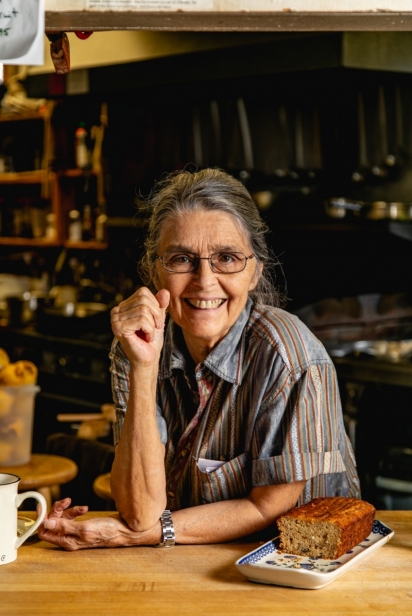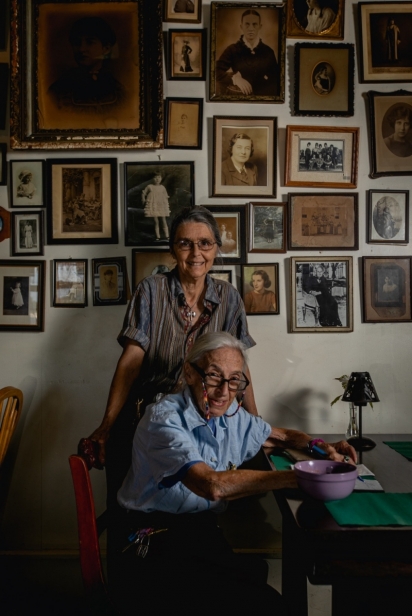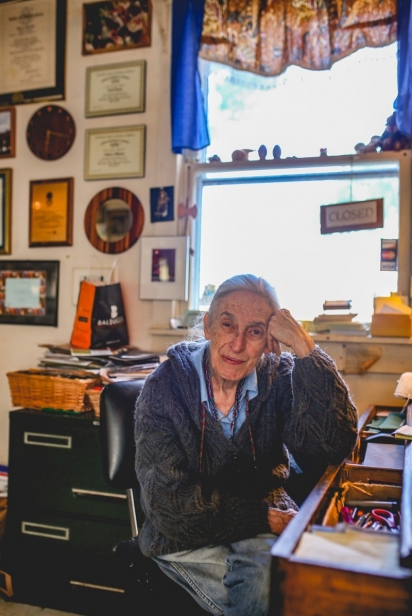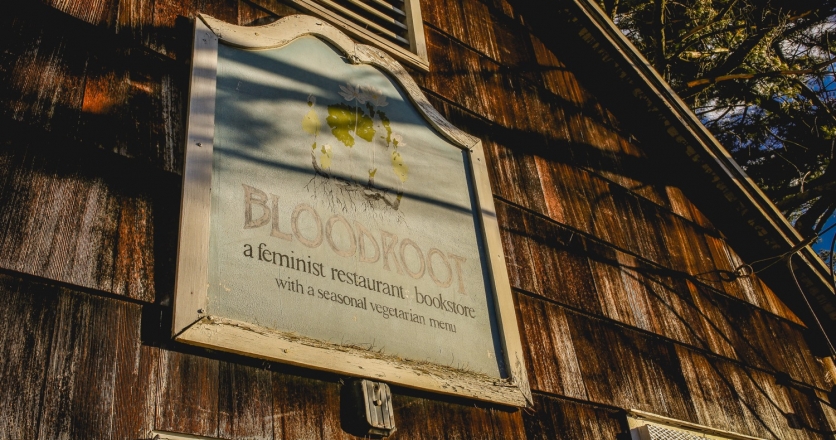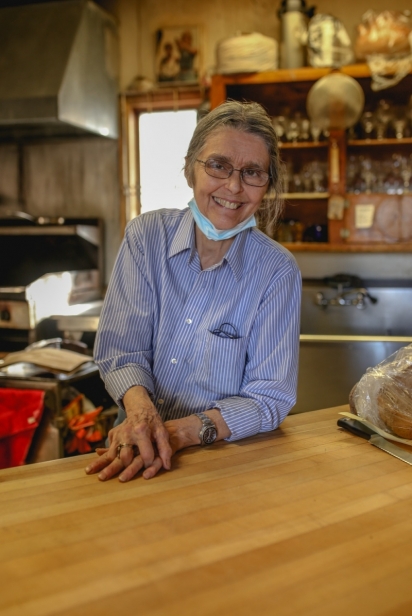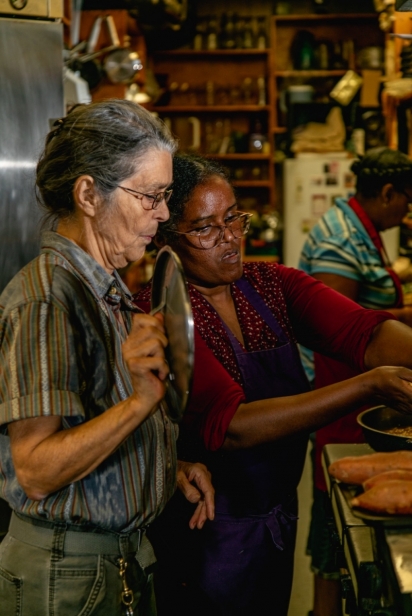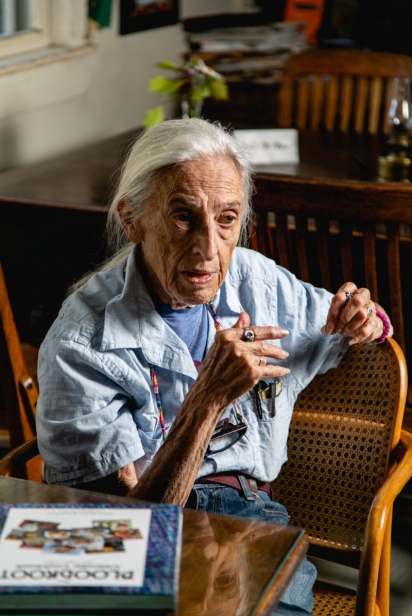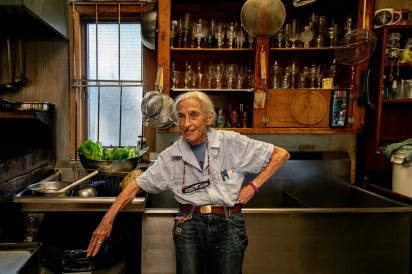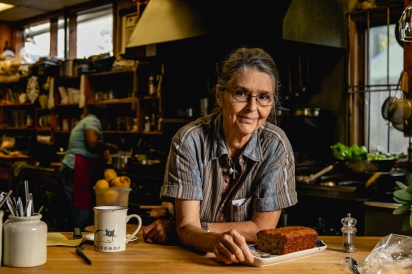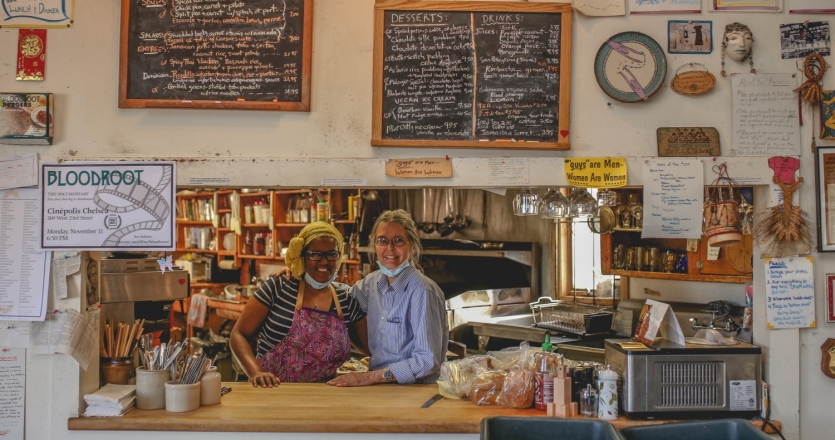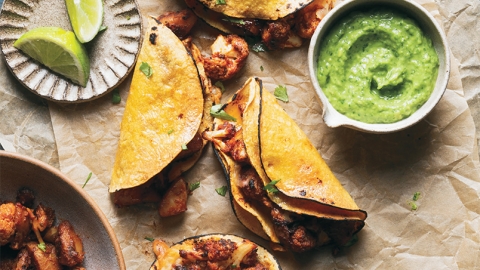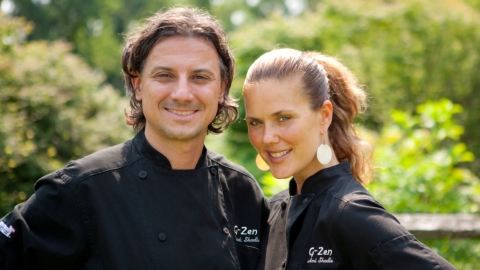Deeply Rooted
Mention the name “Bloodroot” to anyone familiar with the Bridgeport area, and you’ll surely be met with smiles and nods of recognition. Noel Furie and Selma Miriam, owners of the iconic feminist vegan restaurant and bookstore, are fixtures in the community. But the mission-driven enterprise that they’re celebrated for today was, at it’s inception, decidedly counter-culture. Founded in 1977, the restaurant’s roots run deep: what began as a meeting space and safe haven for the Bloodroot Collective, a group of women united through the radical feminist revolution, has grown into a community hub of nourishment for the mind, body, and soul.
At the end of a quiet residential street in Bridgeport, a single-story, wood-shingled cottage rests amidst a conifer stand, boughs beckoning visitors towards the front door. Should you enter through the gate in the picket fence instead, a flagstone path leads through a pebbled patio, where seasoned wooden tables and chairs overlook Brewster Cove. A vine-covered fence obscures the view of the patio from the street; in the era before GPS and smartphones, a visitor in search of the restaurant could easily overlook it. Reminiscing on the process of finding the space, Miriam recalls how others warned of the impracticality of what was then an old machine shop. It was “crazy,” Miriam recalls. There was no sense in selecting “a place that’s impossible to find.” But the waterfront location called to her, and as with so many of the decisions in her life, she decided to “go with [her] gut.”
This attitude led Miriam to find more than just real estate for the business. In 1972, as a self-described “dissatisfied housewife,” Miriam met Furie. Ten years her junior, Furie, also a mother and wife, shared Miriam’s desire to break free from the conventional female domestic lifestyle, to challenge the expectations and limitations placed upon the women of their time, and to set new standards for generations to come. Through attending local meetings of the National Organization for Women, Miriam and Furie connected with numerous like-minded women; together, as the Bloodroot Collective (named for the native New England wildflower whose roots spread and send up shoots, each with their own flower), they yearned for a place where they and other women could meet safely and comfortably to discuss the burgeoning revolution.
Feminist bookstores were becoming increasingly popular across the country with the rise of the women’s liberation movement. In an industry traditionally dominated by male owners, these new bookstores were independently owned by women and sold material relating to women's issues, gender, and sexuality, and served as open spaces for feminist community building and organizing in the early days of the movement. Along with literature, Miriam and Furie also shared a passion for cooking that would serve as a second source of income for their venture. So with a partner, a space, and a dream, Bloodroot, the feminist bookstore and restaurant, opened its doors in 1977.
45 years later, Furie and Miriam are still buzzing with excitement. Sitting in the late afternoon sun, resident cat “Gloria Steinem” stretches across a warm flagstone beside them, as they excitedly discuss what Furie describes as a “revolution in food.” The vegan food movement isn’t just growing, it’s thriving. “What’s happening right now,” Miriam exhales excitedly, “is there are all kinds of things being created by people all over the world, and they’re wonderful things!”
When Bloodroot was established, Miriam and Furie, non-vegetarian at the time, were challenged by their friends and animal rights activists, Jim Mason and Priscilla Feral, president of Friends of Animals. If you’re going to cook food, they said, it’s going to have to be vegetarian. A business that aimed to create equality for all shouldn’t then be contributing to and benefitting from the subjugation of animals. A lover of cooking and challenges, Miriam got to work expanding her culinary skill set.
Miriam grew up in Bridgeport in the 1940s when, as she describes, there were very few Puerto Ricans or Latin Americans. She vividly remembers her first visit to a bodega: yuca, platanos, calabaza — a flurry of new words, colors, smells, and textures. She was enchanted and dove in, finding that exploring new foods from other cultures and, in particular, the cultures that made up the growing working class around her, improved her exploration of vegan and vegetarian cooking. People of a lower socioeconomic class, she says, “oftentimes can’t afford meat and even dairy, so they’re going to be far more creative and work harder at making the food taste good.”
Creating a vegetarian (and now fully vegan) menu has been an ever evolving, learning experience for the women. The restaurant became a test kitchen for more than just new recipes; what were novel ideas at the time for this self-serve eatery have become commonplace today: a blackboard menu to showcase the day’s dishes, ordering at the register, bussing your own table, and an open kitchen where guests can witness the process of cooking, not just the result. There are no chefs at Bloodroot. Rather, “cook” is respectfully used to refer to everyone in the kitchen. The term, “chef,” Miriam feels, can conjure a hierarchy and “hubris” in a kitchen environment. Here, responsibilities are shared (from prep work to cooking to dishwashing), voices are heard, and each person’s time and energy is valued as an essential ingredient in the Bloodroot recipe.
The restaurant employs only women, whose identities and stories are as diverse as the menu. Over the years, a number of employees have come by way of the Mercy Learning Center, a Bridgeport-based nonprofit that provides basic literacy and life-skills training to women in low-income areas. The restaurant provides employment and hands-on learning opportunities for these women. In return, they impart their cultural knowledge, traditions, and experiences to the restaurant. Carol Graham, for example, has been a part of the Bloodroot family for over 12 years and has perfected a vegan Jamaican jerk recipe that is a staple of the menu. Since its inception, women of all backgrounds, ethnicities, races, and religions have worked behind the counter harmoniously. While day-to-day stress is bound to arise, especially in a bustling kitchen environment, the Bloodroot staff's dynamics reflect Miriam’s outlook on human relationships in general: “We’ve got to be kind and listen to each other, and we may not always agree, but that doesn’t mean we should be rude or hurtful.”
The richness that the staff’s backgrounds bring to Bloodroot shines through in every dish, highlighting one of Miriam’s goals in creating the space over four decades ago. “The thing I care most about is a diversity of people and their foods...it’s a never-ending treasure!” she says. You could say the same about the Bloodroot space, itself, which is covered in emblems of the space’s history. One wall is adorned with antique photographs of women; handmade tapestries and rugs hang from dark wooden rafters bridging the vaulted ceiling; the bookstore entices curious minds with colorful titles and a reading nook. Handwritten tags mark the shelves, from feminist history to lesbian fiction, but the must-have books are front and center: the Bloodroot cookbooks. Four books share the best of their tried-and-true dishes, from their 1980 debut The Political Palate: A Feminist Vegetarian Cookbook to the most recent Bloodroot Calendar Cookbook, which is completely vegan. The recipes are simple and approachable for even the most timid cook, rarely spanning more than a handful of steps and using many ingredients already found in a household kitchen.
Never mind living by how much money you make. You need a moral compass, so that by the time you get to be 86 years old, you’re proud of what you’ve done. — Selma Miriam
Miriam and Furie are mission-driven women who run their business with the same ethos and morality that they apply to their daily lives. Unpretentious and sincere, they have a “take it or leave it” vibe that is apparent in every aspect of their business, steadfast but open, welcoming, and accepting of all. Being a completely vegan establishment that wears its radical political views for all to see may make some hesitate, but the women have never downplayed their values for the sake of business. “If we were wanting to make money, we’d be really different, but that was never our intention,” Miriam explains. “Our intention was to make a community and to eat well, ourselves.” Many companies today are careful to keep personal views and political affiliations at a distance, so as not to ostracize consumer groups or jeopardize their brand. Miriam and Furie, however, embrace and display their convictions. “Everything we do is personal — and political. Because the personal is political.”
The hand-painted sign above the front door — “Bloodroot: a feminist restaurant & bookstore” — lays things out just as plainly; the pair believe strongly in the intersection of feminism and food. Gender equality and food systems are inextricably linked, as women constitute the bulk of the global food-related work force. Jessica Milgroom of Agroecology Now explains that “women play [a crucial role] in agriculture as seed keepers, domesticators of plants and breeds, and guardians of diversity. Women are creative food preservers, masters of nutrition, and transmitters of rooted history through their recipes and stories. Women secure and prepare food for their households and communities, they are caretakers, have agency, bring innovative change, and build alternatives and social movements, yet they are largely excluded from economic opportunities and governance spaces.” Without protection for women, our entire food system is jeopardized. By creating a safe space that honors and promotes women’s rights and equality for all, human and non-human, Miriam and Furie have created a business that allows them to remain true to their values — all while whipping up delicious and nourishing meals.
Cook Carol Graham’s Jamaican rum cake is a Bloodroot crowd favorite. While not a traditionally vegan dessert, little by little, she made it vegan, and that’s how Miriam and Furie believe people can lead lives with a strong moral compass: little by little, you work towards leading a life you believe in. It’s a constant work in progress, and “it may never be perfect, but it’s something you apply yourself to, and you just try…we all need a moral compass. They may not be the same; yours may not be the same as mine, but you should live by it,” Miriam says. “Never mind living by how much money you make. You need a moral compass, so that by the time you get to be 86 years old, you’re proud of what you’ve done.”
And Miriam certainly is proud: “I love food! I love food, I love people, I love diversity. These are the things that matter in my life more than anything, and I think I’m incredibly lucky, ‘cause I’ve gotten to have so much of all of those things.”
> Bloodroot: 85 Ferris St., Bridgeport; 203-576-9168


